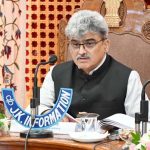Wajood e Zan Se Hain Tasweer e Kayinat Mai Rang,
Isi K Saaz Se Hai Zindagi Ka Soz e Daroon (Allama Iqbal ra)
Woman is the most beautiful creation of the creator who is perpetually empowered enough to continue the life on Earth. Whether a living organism is a human being or any other creature; it is a mother who is entitled to give birth thus she is the propagator of the existence. When we study about cell biology, we get familiar with the process of cell division. And always it is a mother cell that breaks down into constituent daughter cells and process goes on. But at an organism level, both the genders are equally important and incomplete without each other. The cart of life moves ahead when both the genders get synchronized towards the progression. The societal or the national progress is impossible without the active participation of a woman.
Women empowerment is a diverse and revolutionary notion in that it transcends cultures and individual situations. It’s not enough to possess some degrees or vocational achievements, for it also embodies a woman’s latent capabilities, capacities, and her self-determination. When we investigate the definitions of women’s empowerment in Islam, it’s imperative that we also dwell on real life instances as well as the philosophies that feed into the discourse surrounding such an important aspect of society. Top of FormBottom of FormTop of FormBottom of Form
Women Empowerment as per Holy Quran and Sunnah
This is one of the core foundations of Islam, empowerment of women, dignity in their rights and roles in the society. The Holy Quran emphasizes the equality of men and women in spiritual and moral worth, pointing to the fact that “both are partners in fulfilling the divine purpose on earth”. A whole chapter (Surah Nisa) in Holy Quran has been dedicated to women and their rights. Verily, Islam grants women their rights to education, inheritance, and participation in social, political, and economic life, unprecedented at the time. The Prophet Muhammad’s (PBUH) Sunnah further emphasizes these aspects by the examples of highly capable women that he himself introduced, such as Umul Mumineen Hazrat Khadija (RA) who was successful in business ventures and Umul Mumineen Hazrat Aisha Sidiqa (RA) who contributed greatly to scholarly knowledge in Islam.
The teachings of the Prophet Muhammad (PBUH) lay emphasis on being nice and just with respect to women, encouraging their full participation in public life while keeping them under protection, support, and reverence. Thus, both the Holy Quran and the Sunnah provide an expansive apparatus for empowering women to plead for their dignity, independence, and integral function in society. The teachings of Holy Quran and Sunnah for promoting women’s rights and empowerment can be summarized around several key principles (Naguib, 2024)
Recognition of Equality and Complementarity: Islam, as conveyed in the Holy Quran, acknowledges the equal worth and complementary roles of men and women in their spiritual essence. In Surah An-Nisa (4:1), it states, “O humankind, reverence your Lord, who created you from a single soul and from it created its mate and dispersed from the two of them multitudes of men and women.” This verse emphasizes the shared origin of both genders and their mutual contribution to humanity’s development. The Prophet Muhammad (PBUH) referred to women as “the counterparts” or “conjoined twins” of men, underscoring the close, interdependent relationship between the genders. This belief in the inherent worth of women is central to Islamic teachings and supports the rights and protections Islam offers to women.
Emphasis on Free Will and Freedom of Choice: Verses of the Holy Quran, which are from Surah Al-Kahf (18:29), as well as Surah Al-Baqarah (2:256), describe a person to make his decisions solely based upon their free will while believing because these are key considerations for one being held responsible or accountable in front of Almighty Allah. Individuals are accountable for their choices and actions, and without freedom of choice, this accountability would be meaningless.
Equality in Responsibilities and Rewards: The Holy Quran upholds the principle of equality between men and women regarding obligations and rewards. Surah Al-Isra (7:15) states, “And there is no burden on one that is another’s burden,” highlighting individual responsibility and the idea that everyone will be judged and rewarded according to their deeds, regardless of gender. This promotes justice and fairness, as each person is evaluated on their actions alone.
The Right to Education: Islam heralded a new era of knowledge and enlightenment, marking the end of the Age of Jahiliya (ignorance). The Holy Quran and Sunnah emphasize the importance of acquiring knowledge, making it an obligation for all. The verse “And say, ‘My Lord, increase me in knowledge’ (TaHa, 20:114)” encourages continuous learning and humility. The contributions of female scholars throughout Islamic history, including the Prophet’s wives (Umhatul Mumineen) and figures like Fatima al-Fihri, who founded the University of Qarawiyin in 859 AD, underscore Islam’s emphasis on education for women.
Equal Right to Earnings: Islam asserts that both men and women have equal rights to keep the earnings they receive, whether from inheritance or their own efforts. Surah An-Nisa (4:32) reinforces this by stating, “For men is a share of what they have earned and for women is a share of what they have earned,” establishing the principle that both genders have the right to own property and benefit from their labour.
Right to Advocacy: A key example of women’s right to advocate is seen in the story of a woman who challenged the unjust practice of Zihar (divorce) in pre-Islamic Arabia. She approached the Prophet Muhammad (PBUH) and narrated it in context of welfare of her kids, after advocating for her rights, Allah revealed a judgment that abolished this practice. This story, found in Surah Al-Mujadila referring “The Pleading Woman” (58:1), highlights the significance of women’s voices in enacting positive change and emphasizes the need to ensure their voices are heard.
Right to Political Participation and Leadership: Islam recognizes the right of both men and women to participate in political and leadership roles. In the early Islamic period, women were involved in the political processes, such as the bay’ah (allegiance) to the Prophet. Women in early Islam were granted the right to vote long before this right was extended to women in the West. A notable example is Al-Shifa’, a woman appointed as the Minister of Trade and Commerce by Caliph Hazrat Omar (RA) who oversaw commercial affairs.
In a Hadith Book (Muslim), it is mentioned that Messenger of Allah (PBUH) said: “Woman has been created from a rib and will in no way be straightened for you; so if you want to benefit from her, you will benefit from her while crookedness remains in her. If you attempt to straighten her, you will break her, and breaking her is divorcing her” (Riyad as-Salihin 273). Moreover, another Hadith is quoted as, “The best of you are those who are the best to their women” (Sunan al-Tirmidhī 1162). Thus, it is advised to believers to be gentle to one’s wife/wives and gentleness of all acceptable sorts (without breaching of the thin lines by womenfolk) itself paves the foundation of empowerment in society.
In nutshell, the teachings of the Holy Quran and Sunnah provide essential principles for advancing women’s rights and empowerment. Concepts such as equality, free will, responsibilities, education, property rights, political participation, and leadership affirm the dignity and worth of women in Islamic traditions. These core values offer a framework for protecting women’s rights within Islam, and it is crucial to advocate for these principles in societies where cultural and political influences may have led to deviations from these teachings. Policymakers can utilize these teachings to create laws and policies that empower and protect women, ensuring their active participation in society.
(The Author is Ph.D. and PDF; a distinguished researcher, renowned compere/broadcaster at All India Radio, Srinagar. For feedback, she can be reached at [email protected])










